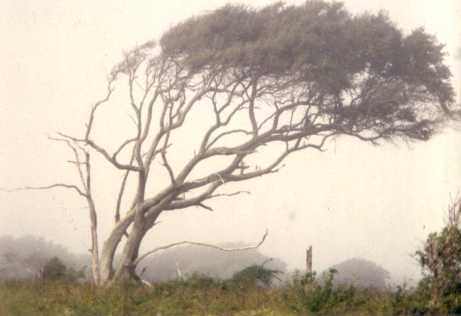
A Salty Situation
It seems Northwest Florida sure dodged a bullet when Tropical Storm Debbie decided to head east. The citizens and structures may have dodged the bullet but the plant life had unseen pressures on it. All of the plants in the coastal region of Northwest Florida have some salt tolerance associated with them if they are surviving, and we can see that by the way our plants have been shaped by salt spray on our barrier islands.
The far west counties of Florida were on the “dry side” of the Tropical Storm causing some plants to be damaged that may usually be unharmed by the salt spray. For example X Cupressocypris leylandii or Leyland Cypress is a moderately tolerant plant to salinity. I examined some Leyland Cypress in Santa Rosa County that had damage solely on the side facing Escambia Bay. The property’s owner thought that it must be some kind of disease considering that it had never been harmed by salt spray before in the previous six years since being planted. On further examination, I noticed that there was an azalea in the next yard with brown foliage and a Trumpet Vine in the top of the Leyland Cypress that also had damage to its foliage. This made me curious to whether or not salt spray is more damaging on the dry side of a T.S.
After some research on the matter, it was apparent that it was salt spray damage. With the winds being steady from the north east on this particular property and extremely dry weather accompanied with the “dry side” of T.S. Debbie, the salt spray had some devastating effects to some landscape plants. It was a perfect combination to wreck havoc on the Leyland Cypress planting. Without the large amounts of rainfall, the plant’s foliage does not have the opportunity for the salt to be washed off. The salt accumulates on the leaves and even for a moderately tolerant plant such as Leyland Cypress; the foliage begins to brown or “burn”. This eventually causes necrosis or tissue death.
If you have experienced “burnt” looking foliage on some of your less tolerant plants after T.S. Debbie, it may not be a disease like you may have suspected. It could be the unfortunate effects of the “dry side” of the storm and a heavy salt accumulation.
For more information and comments, please email Santa Rosa County Extension Agent Blake Thaxton at bthaxton@ufl.edu.


